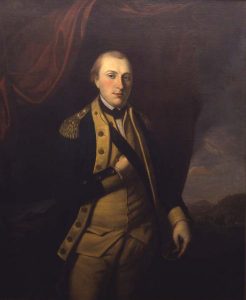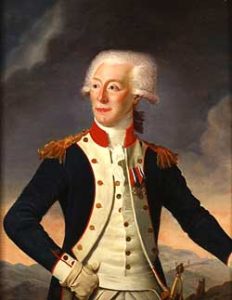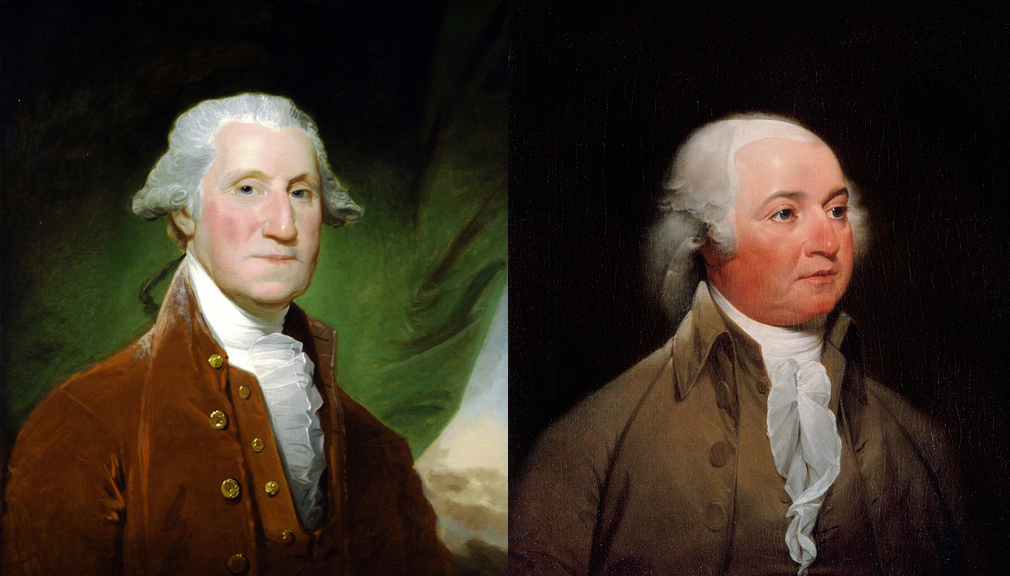Dear Mr. History:
I’ve read that before he became a hero in the Continental Army, Lafayette departed France in defiance of orders from King Louis XVI and only a few steps ahead of the law. Can this be true? Sincerely, Francophile.
Dear Franco:
Mais oui, it’s true; Lafayette’s departure from France involved more twists and turns than the alleys of Paris. Here’s what happened.

When the American rebellion opened in the spring of 1775, Marie-Joseph-Paul-Yves Roch-Gilbert du Motier de La Fayette, the Marquis de La Fayette, was a 17 year-old French Army lieutenant assigned to the garrison of Metz; he was also one France’s richest aristocrats. His wife Adrienne, two years younger than he, was pregnant with their first child. Both of Lafayette’s parents were in their graves so his patriarchal figure was Adrienne’s father, the powerful Duc d’Ayen. Lafayette learned of the American rebellion that summer and, immediately enamored with the cause, announced his intention to volunteer for service in the Rebel army. But the Duc d’Ayen disapproved the idea. And at the royal court at Versailles, King Louis XVI’s Foreign Minister, the Comte de Vergennes, also saw opportunity for France to regain some colonial territory and power in America if it could influence the conflict without directly entering it. But there was little Lafayette or Vergennes could do; Britain and France were not at war, and any direct aid to the American Rebels would outrage Britain.
A year later in the early summer of 1776, however, one of Vergennes’s intelligence operatives, Pierre-Augustin Caron de Beaumarchais, convinced him and the king to funnel support to the Americans through the establishment of a bogus trading company which would have no apparent ties to the French government. Imaginative and driven, Beaumarchais was a businessman, adventurer, sometime spy, and playwright (famous as the author of The Barber of Seville); he was well-qualified for such a risky clandestine operation. With one million livres from the French treasury and an equal amount from Spain, he set up the fictional Hortalez Company, with himself as the owner under the pseudonym Roderigue Hortalez, and laid the groundwork to send support to the American Rebels.
Then in July 1776, Silas Deane, a representative from the Continental Congress’s Committee of Secret Correspondence, arrived in Paris. Deane’s instructions were to pose as a normal merchant while secretly negotiating support from France, including “clothing and arms for twenty five thousand men with a suitable quantity of ammunition, and one hundred field pieces.”[1] Deane met with Vergennes about a week after his arrival, and though Vergennes did not commit to providing support, he agreed to continue negotiations in secret. Vergennes also put Deane in contact with Beaumarchais, and the two began secretly collecting material for shipment to America.
Deane was also bombarded with requests by French Army officers who sought the adventure of joining the Continental Army. Soon after the Vergennes meeting, Dr. Jacques Barbeu-Dubourg, a colleague of Benjamin Franklin’s in Paris, brought Deane a list of officers who volunteered for service in America. Beaumarchais also convinced Deane that the artillery he sought to purchase would be useless without trained soldiers to operate the guns. Deane began accepting the applicants, often with promises of high rank, though he had no instructions from Congress to do so. On August 18, Deane wrote to Congress that “several young gentlemen of fortune, whose families are nearly connected with the court, are preparing to embark for America, by each of whom I shall without disguise write you the characters they sustain here.”[2] In the first week of December Deane had at least 16 French officers committed to Continental Army service, including Johann de Kalb, a Prussian-born soldier of fortune who had recently served on the staff of Lafayette’s commander at Metz, the Comte de Broglie.[3] Deane’s list did not include Lafayette. Not yet anyway.
Lafayette, now 19 and a captain, eagerly volunteered to join the officers going to America. Broglie at first rebuffed him, saying that Lafayette’s duty was to his family and France. But Lafayette persisted; Broglie relented and sent Lafayette with Kalb to see Deane in early December. The young marquis was not the type of seasoned recruit that Deane sought, but Lafayette recalled, “I spoke more of my ardour in the cause than of my experience.”[4] Won over, Deane offered Lafayette a commission as a major-general on December 7, 1776. Only the officers volunteering with Lafayette knew of his plans – he did not even inform his wife. He later wrote that such secrecy was “almost a miracle; family, friends, ministers; French spies and English spies, all were kept completely in the dark as to my intentions.” He credited Broglie, “whose affectionate heart, when all his efforts to turn me from this project had proved in vain, entered into my views with even paternal tenderness.”[5]
In reality, Broglie was being about as paternal as a pit viper. Unbeknownst to Lafayette, Broglie plotted to gain command of the Continental Army and was recruiting Kalb to help him. “A military and political leader is wanted,” Broglie wrote to Kalb on December 11, “a man fitted to carry the weight of authority in the colony, to unite its parties, . . ..” Broglie went on to Kalb’s mission, which was to get the Americans to buy the plan and “content yourself with stipulating for a military authority for the person in question, who would unite the position of a general and president of the council of war with the title of generalissimo, field marshall, etc.”[6] Kalb passed the plan in glowing terms to Deane on December 17.[7] Deane’s opinion of the idea is unclear, but he had already suggested to Congress on December 6 that they consider Broglie as one to “take the lead of your armies . . . it would give a character and credit to your military, and strike perhaps a greater panic in our enemies. I only suggest the thought and leave you to confer with the Baron de Kalb on the subject at large.”[8] Without more evidence the true intent of all these surreptitious suggestions is elusive, but it sure seems that Broglie was planning something underhanded, and Lafayette was unwittingly along for the ride.
By mid-December Beaumarchais had three ships ready to depart from the port of Le Havre with loads of materials and Deane’s recruits, including Lafayette and Kalb. On December 12, Beaumarchais arrived at Le Havre to supervise their momentous departure. It was a risky move; the British ambassador, Lord Stormont, had spies throughout France that informed him about Deane’s and Beaumarchais’s activities. Catching Beaumarchais in the act of sending loaded ships to America would have been the smoking gun Britain needed to officially protest the French aid. Beaumarchais traveled incognito as “Monsieur Durand” to foil British spies, and everything was tres bien until he noticed that a local theater was presenting his play, The Barber of Seville. There was no manual for clandestine operations at the time, but if there was one, it might have contained an instruction like, “when under cover, never, never, never abandon your disguise, take control of a local play that you authored, and attend the play’s evening performance while bowing to the crowd’s applause,” which is exactly what Beaumarchais did. It didn’t help matters that some of the officers about to embark bragged about their planned adventure in the coffee houses of Le Havre, and two of the younger volunteers wrote to their families for permission to leave France. With all this activity in the open British informants discovered Beaumarchais’s business in the port without even breaking a sweat.
Now people got mad. Lord Stormont lodged an angry protest about the French aid. The Duc d’Ayen raged at Lafayette for abandoning his family. And Vergennes was furious that he faced the very diplomatic scuffle he hoped to avoid. To appease the British, Vergennes forbade the departure of Beaumarchais’s ships, recalled the volunteer officers to Paris, and ordered the arrest of any soldier who claimed he was going to America on orders from the French government. One ship, the Amphitrite, sailed before the orders arrived but the other two ships stayed in port, leaving Lafayette, Kalb and a number of Deane’s recruits stuck in France.
But you can’t keep a good marquis down, especially one who was extremely wealthy. Lafayette visited Deane and told him, “I shall purchase a ship to carry out your officers; we must feel confidence in the future, and it is especially in the hour of danger that I wish to share your fortune.”[9] An assistant of Broglie’s found a suitable ship in the port of Bordeaux, Lafayette signed to finance it on February 11, 1777, and they re-named the ship La Victoire.
To calm his family down, as well as disguise his intentions, a week later Lafayette left to visit the French ambassador in London, who was the Duc d’Ayen’s uncle. The Marquis was the toast of London society, and rubbed elbows with Lord George Germaine, Britain’s secretary for the American colonies, and his future opponent General Henry Clinton. He was even presented to King George III. “A youth of nineteen may be, perhaps, too fond of playing a trick upon the king he is going to fight with,” Lafayette recalled.[10] After three weeks Lafayette returned to France but to avoid being absolutely forbidden to go to America by his father-in-law, he hid at Kalb’s house outside of Paris for three days, all without a word to his family.
Several officers still volunteered to go to America, and in March, Kalb had them to travel secretly to the La Victoire at Bordeaux. This time it was Lafayette himself who gave the plan away by announcing his intentions in a letter to his father-in-law delivered on March 17, the day after he departed for Bordeaux. The situation was worse than before; such blatant support for the Rebels so soon after the Marquis had been a guest at the Court of St. James was an insult to both George III and Louis XVI. The Duc d’Ayen was enraged again, and demanded Versailles prevent Lafayette’s departure. In an attempt to stamp down any trouble, Louis XVI publicly forbade any and all French officers, particularly Lafayette, from leaving France to support the Rebels.[11]

But the party of officers reached Bordeaux ahead of the king’s orders and Lafayette boarded La Victoire under an assumed name. Guilt overtook him since he was, after all, running away from home, and he sent a note to Paris to gauge his wife’s feelings. Funny thing about families – they tend to hate abandonment – so the response he received a week later was not favorable. But Lafayette was following a dream, which has been the bane of wives throughout time, and he ordered the ship to sea.
La Victoire stopped at the small Spanish port of Los Passajes and Kalb convinced Lafayette to repair relations with his family before their final departure from Europe. The king’s desist order, as well as letters from his family entreating him not to go, caught up with the ship in port and Lafayette’s guilt overtook him. Taking the missives to heart, he returned to Bordeaux to face the music and left La Victoire at Los Passajes to await instructions. At Bordeaux he wrote to Versailles, justifying his actions. There was talk there that the king’s orders were only for show, and when no reply from the court came in what he thought was a timely manner, Lafayette considered “silence was a tacit consent.”[12] It was a classic case of “selective hearing” by a teenager. But the military commander at Bordeaux didn’t buy any of that and threatened to arrest the Marquis unless he delivered himself to authorities at Marseilles. Lafayette pretended to comply and left Bordeaux in a coach under escort. But on the road, he eluded his escorts and “disguised as a courier” as he recalled, escaped and sped off to Los Passajes and the waiting La Victoire.[13] The ship finally sailed for America on April 26, 1777, with Lafayette, Kalb, and about a dozen other officers.
This was certainly not the final act for any of the players in this drama. Lafayette and his party arrived on the American shore on June 13 and they eventually joined the Continental Army. Broglie’s plot fizzled after Kalb realized that it “would be regarded no less as an act of crying injustice against Washington, than as an outrage on the honor of the country,” as he wrote Broglie.[14] Kalb was an effective officer and tough fighter until his death at the battle of Camden, South Carolina in 1780. Beaumarchais sent over five million livres worth of aid to the Americans through the Hortalez Company. Silas Deane became one of America’s first ministers to France, but in 1777 Congress recalled him with charges of misconduct, some stemming from his promises of high ranks to so many French officers.
Lafayette, of course, went on to be a hero in the Continental Army and a devotee of General Washington. It appears that he never learned about Broglie’s plot. But most importantly, Lafayette soothed his wife’s feelings through some heartfelt letters, she forgave him for his impetuous running off, and they lived a long life together.
That last line has nothing to do with the fact that my wife reads all of my articles.
There is much more to this fascinating and complicated story. To read more, check out Lafayette, by Harlow Giles Unger, For Liberty and Glory: Washington, Lafayette, and Their Revolutions, by James R. Gaines, or Lafayette’s own Memoirs, Correspondence and Manuscripts of General Lafayette.
[1] The Secret Committee of Congress to Silas Deane, March 3, 1776, The Deane Papers, Volume I, 1774-1777, (New York: New York Historical Society, 1886), 123-124.
[3] “List of Officers of Infantry and Light Troops Destined to Serve in the United States of North America,” enclosure to Deane to the Secret Committee of Congress, December 6 1776, Deane Papers, Vol. I, 405.
[6] Broglie to Kalb, December 11 1776, Friedrich Kapp, The Life of John Kalb, Major-General in the Revolutionary Army (New York: Henry Holt & Co., 1884), 95-96.
[8] Deane to the Secret Committee of Congress, December 6 1776, Deane Papers, Vol. I, 404. The plot is also discussed in a note to Deane’s letter in the Library of Congress current digital version of The Revolutionary Diplomatic Correspondence of the United States, Volume 2, accessed November 3 2013 via http://memory.loc.gov/cgi-bin/query/r?ammem/hlaw:@field(DOCID+@lit(dc002103)).









3 Comments
I find this site exceptional for articles about people, places and events that simply don’t get reported. Sure, Nathan Hale was hung, Washington crossed the Delaware and Lafayette was a hero. But the story around Lafayette’s effort to reach America as described in this terrific article portrays him as a determined teenager willing to risk his own life, fortune and sacred honor. The other learning moment was reading about all the intrigue that surrounded his intention to go to America. The more I read, at this Journal and in other works, the more it appears that the years of the War were filled with as much intrigue and backroom dealing as the actual battles fought in the open.
I’m very glad you enjoyed the piece Steven, and thanks for your readership!